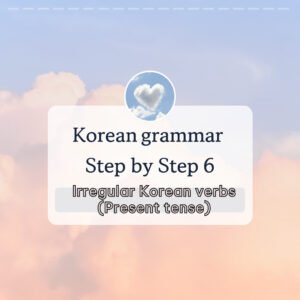– 위해 / – 으려고 : for, in order to
Hello, everyone!
Welcome to today’s lesson!
Today, we will delve into the grammar points “위해” and “으려고” to express the purpose behind your actions.
We will explore how to use these expressions to convey sentences like “I study to get into a university” and “I will cook for you.”
By the end of this lesson, you’ll have a clearer understanding of how to articulate your intentions and purposes in Korean, whether you’re aiming for a formal or casual tone. We’ll cover the nuances of each expression, providing you with practical examples to help you use them effectively in your conversations.
Let’s dive in and conquer them all today in this post!
I will explain each point step by step to facilitate understanding.
So just follow along with me!
Part 1,
Let’s grasp the concept of grammar
“for the sake of” or “for”: – 을/를 위해(서)
“in order to” : – 기 위해(서)
We will learn how to express “for” in the sentence like : I’ll cook for my mom, I’ll do it for you.
⭐For/For the sake of + nouns⭐
When a noun ends in a vowel: 를 위해(서)
When a noun ends in a batchim(final consonant): 을 위해(서)
서 is often omitted!
Examples 😊
엄마를 위해 요리 할 거예요.
I’ll cook for my mom.
(엄마 ends in a vowel, we add 를 and 위해)
너를 위해서 해 줄게요.
I’ll do it for you.
(너 ends in a vowel, we add 를 and 위해)
존을 위해 편지를썼어요.
I wrote a letter for John.
(존 ends in a batchim, we add 을 and 위해)
가족을 위해서 열심히 일해요.
I work hard for the sake of my family.
(가족 ends in a batchim, we add 을 and 위해)
건강을 위해 담배를 끊었어요.
I quit smoking for the sake of my health.
(건강 ends in a batchim, we add 을 and 위해)
* Be careful with the order! As you can see, we start with the reason first. The order is almost completely reversed!
‘을/를 위해(서) ‘ tends to emphasize purpose, benefit, or the reason behind an action, much like “for the sake of” in English.
If you change “을/를” part to “기” and add”위해(서)” with verbs, it means “in order to”
“기 위해(서)” is used to express the purpose of an action. It is used to clearly state why an action is being performed. It’s like “in order to” in English.
⭐In order to + verbs⭐
Simply drop the verb ending “다” and add “-기 위해(서)”
Just like 을/를 위해, we start with the reason first.
Examples 😊
행복한 삶을 살기 위해 긍정적으로 생각해요.
I think positively in order to live a happy life.
*살다(to live) + 기 위해(in order to) -> 살기 위해
시험에 합격하기 위해서 매일 공부해요.
I study every day in order to pass the exam.
*합격하다(to pass) + 기 위해서(in order to) -> 합격하기 위해
결혼하기 위해 돈을 모으고 있어요.
I am saving money in order to get married.
* 결혼하다(to marry) + 기 위해(in order to) -> 결혼하기 위해
환경을 보호하기 위해서 매일 걸어 다녀요.
I walk everyday to protect the environment.
* 보호하다(to protect) + 기 위해(in order to) -> 보호하기 위해서
서 is often omitted, it’s optional!
Then how can we express “in order to” or “to” a little bit more casually? “In order to” is a bit formal, right? And “기 위해” is used to give emphasis on the action or reason. In casual conversation, this grammar point is more commonly used:
“to”: ~ (으)려고
This structure is used to express the intention to do something. It is most commonly used to express “to”.
When a verb ends in a vowel: 려고
When a verb ends in a batchim: 으려고
Verbs ending in “ㄹ” batchim is an exception, we add “려고” directly!
Examples 😊
한국어를 배우려고 학원에 다녀요.
I attend an academy to learn Korean.
*배우다(to learn) + 려고(to) -> 배우려고 (배우다 ends in a vowel, we add 려고!)
맛있는 음식을 만들려고 요리책을 샀어요.
I bought a cookbook to make delicious food.
*만들다(to make) + 려고(to) -> 만들려고 (만들다 ends in ㄹ, we directly add 려고!)
친구(를) 만나려고 카페에 갔어요.
I went to the cafe to meet a friend.
* 만나다(to meet) + 려고(to) -> 만나려고 (만나다 ends in a vowel, we add 려고!)
먹으려고 살아요.
I live to eat.
* 먹다(to eat) + 으려고(to) -> 먹으려고 (먹다 ends in a batchim, we add 으려고!)
여행을 가려고 비행기 표를 예약했어요.
I booked a plane ticket to go on a trip.
* 여행가다(to go on a trip) + 려고(to) -> 여행가려고 (여행하다 ends in a vowel, we add 려고!)
For me, “기 위해” sounds more formal and is often used to emphasize the purpose or goal of an action.
I typically use “(으)려고” in everyday conversations because it feels more natural and casual.
However, “기 위해” is preferable when you want to clearly express the purpose behind your actions, particularly in more formal contexts.
You’ll likely hear “(으)려고” more frequently in daily conversations due to its informal and conversational nature, while “기 위해” is used when you want to give a stronger emphasis on the purpose of the action.
You can specifically use “-(으)려고” at the end of a sentence when the remainder of that sentence is implied or can be easily assumed. When used this way, it typically indicates that the speaker is just about to take an action or is in the process of doing so. It is commonly employed to express immediate plans or intentions.
Examples 😊
마트에 갔어? (Did you go to the store?)
아니, 지금 가려고. (No, I’m about to go right now.)
밥 먹었어? (Did you eat?)
아니, 지금 먹으려고. (No, I’m about to eat now)
Notice that these constructions might seem like incomplete sentences because “-(으)려고” is typically used between clauses rather than at the end of a sentence. However, the language has evolved to accept these forms as correct.
Additionally, you can add the honorific “요” to “-(으)려고” when used at the end of a sentence to make it more polite and formal.
일을 다 했어요? (Have you finished the work?)
지금 하려고요. (I’m about to do it right now)
책을 읽었어요? (Did you read the book?)
아니요, 지금 읽으려고요. (No, I’m just about to read it now.)
Now, we will add “하다(to do)” verb after (으)려고!!!
The expression “-(으)려고 하다” is a combination of “-(으)려고”, which indicates purpose or intention, and “하다”, which means “to do.” When these are combined, “-(으)려고 하다” conveys a nuanced meaning of trying to do something, intending to do something, or planning to do something. It adds an element of effort or intention, often implying that the action is in the planning stage or is being actively considered.
This is an ending grammar point, so it is used at the end of the sentence, unlike the “-(으)려고” grammar point, which is typically used within the sentence
Examples 😊
저는 이번 주말에 공부하려고 해요.
I plan to study this weekend.
* 공부하다(to study) + 려고 해요(plan to) -> 공부하려고 해요 (공부하다 ends in a vowel, we add 려고!)
내일은 친구를 만나려고 해. (Casual)
I’m intending to meet a friend tomorrow.
* 만나다(to meet) + 려고 해요(intend to) -> 만나려고 해요 (만나다 ends in a vowel, we add 려고!)
다음달에 여행을 가려고 합니다. (Extremely formal)
I’m planning to go on a trip next month.
* 가다(to go) + 려고 해요(plan to) -> 가려고 해요 (가다 ends in a vowel, we add 려고!)
건강을 위해 매일 운동하려고 해요.
I try to exercise every day for my health.
* 운동하다(to workout) + 려고 해요(try to) -> 운동하려고 해요 (운동하다 ends in a vowel, we add 려고!)
다음 달에 한국어 수업을 들으려고 해요.
I’m planning to take a Korean language class next month.
* 수업을 듣다(to take class) + 으려고 해요(plan to) -> 들으려고해요 (듣다 ends in a batchim, we add 으려고!)
매일 아침에 일찍 일어나려고 해요.
I try to get up early every morning.
* 일어나다(to get up) + 려고 해요(try to) -> 일어나려고 해요 (하다 ends in a vowel, we add 려고!)
If you conjugate this grammar with the past tense, like 가려고 했어요 (I planned to go, I was trying to go, I intended to go), it means “I was going to…” It is very commonly used together with the 는데 grammar, which means “but.”
Here’s an example:
“I was going to go to the party, but I got sick.“
파티에 가려고 했는데, 아팠어 (가려고 했어요 + 는데 -> 가려고 했는데)
“I was going to do the homework, but I got busy.“
숙제 하려고 했는데, 바빴어 (숙제 하려고 했어요 + 는데 -> 하려고 했는데)
“I was going to eat, but I didn’t have time.”
밥 먹으려고 했는데, 시간이 없었어 (먹으려고 했어요 + 는데 -> 먹으려고 했는데)
“I was going to finish it yesterday, but It was too much.“
어제 끝내려고 했는데, 너무 많았어 (끝내려고 했어요 + 는데 -> 끝내려고 했는데)
Now, let’s practice using these grammar rules in real sentences. I’ve prepared some mixed sentences for you !😊
Part 2,
Practice making sentences
1. I can give up everything for the sake of love.
(give up: 포기하다 / everything: 모든것 / love: 사랑)
2. I plan to study Korean for two hours every day.
(every day: 매일)
3. I’ll always fight for peace. I hate wars.
(always: 항상/ fight: 싸우다 / peace: 평화 / war: 전쟁/ hate: 싫다)
4. I work really hard at the company to get a promotion.
(hard: 열심히 / company: 회사 / to get a promotion: 승진하다)
5. These days, I’m trying to read two books a day .
(these days: 요새 / day: 하루)
6. In Korea, we spend a lot of money for their children’s education.
(spend money: 돈(을) 쓰다/ children: 아이들 / education: 교육)
7. I had to save money in order to start a business.
(save money : 돈(을) 모으다/ start: 시작 / business: 사업)
8. I’m planning to do an internship during the summer vacation.
(do an internship: 인턴쉽(을) 하다 / during: 동안/ summer vacation: 여름 방학)
9. I practiced for more than 3 hours a day to drive well.
(practice: 연습하다 / more than: 이상 / day :하루 / drive: 운전하다 / well: 잘)
10. Where are you going now? I’m going home now. (I’m about to go home)
(now: 지금)
11. I don’t have cheese, so I’m going to buy cheese. (I’m about to buy cheese) (casually)
(cheese: 치즈)
12. I was going to sleep early last night, but I couldn’t fall asleep until 3 am. (casually)
(early: 일찍/ last night: 어젯밤/ fall asleep = sleep: 자다 /until: 까지/ am: 새벽)
13. For my happiness, I try to spend time alone sometimes.
(happiness: 행복 / spend time: 시간(을)보내다 / alone: 혼자/ sometimes: 가끔)
14. Since Chinese and Japanese are similar, I’m trying to learn them together.
(Chinese: 중국어 / Japanese: 일본어 / similar: 비슷하다 / together: 같이)
15. I’m using a language exchange app to make Korean friends.
(use: 쓰다 / language exchange app: 언어교환앱/ make: 만들다)
16. We were going to go to the amusement park last week, but we had to cancel because it rained.
(amusement park: 놀이공원 / last week: 지난주/ cancel: 취소하다 / rain: 비(가) 오다)
Thy these on your own first, before checking the answers!
These are the answers:
1. I can give up everything for the sake of love.
(give up: 포기하다 / everything: 모든것 / love: 사랑)
사랑을 위해(서) 모든것(을) 포기할 수 있어요.
* “for + noun,” we will use 을/를 위해서. Since 사랑 ends in a batchim, we will add 을 and 위해(서)! 😁
* To express “can”, we can use ㄹ/을 수 있어요 grammar, if you don’t remember it, please check it out here!
2. I plan to study Korean for two hours every day. (casually!)
(every day: 매일)
매일 한국어(를) 두시간동안 공부하려고 해.
* To express “plan to,” “intend to,” or “try to,” we can use (으)려고 하다! Since 공부하다 ends in a vowel, we’ll add 려고 and 하다.
* After “today,” “yesterday,” “tomorrow,” and “every day,” we don’t add 에.
* To express “for 2 hours,” you can use 씩 instead of 동안 as well. You can check out the grammar for 씩 here!
3. I’ll always fight for peace. I hate wars.
(always: 항상/ fight: 싸우다 / peace: 평화 / war: 전쟁/ hate: 싫다)
항상 평화를 위해 싸울 거예요. 전쟁(이) 싫어요.
* “for + noun,” we will use 을/를 위해서. Since 평화 ends in a vowel, we will add 를 and 위해(서)! 😁
* You can say “전쟁을 싫어해요” instead of “전쟁이 싫어요”! They are synonyms.
4. I work really hard at the company to get a promotion.
(hard: 열심히 / company: 회사 / to get a promotion: 승진하다)
승진하려고 회사에서 진짜 열심히 일해요.
* “To get a promotion”, to express “to” part, we have 2 options: (으)려고 or 기 위해서. Here you can say 승진하기위해서 as well, just 승진하기 위해서 emphasizes the purpose or reason behind an action. It can be translated as “for the sake of getting promoted” or “in order to get promoted.” 승진하려고 is more commonly used and a bit more casual.
5. These days, I’m trying to read two books a day.
(these days: 요새 / day: 하루)
요새 하루에 책 두권씩 읽으려고 해요.
* To express “plan to,” “intend to,” or “try to,” we can use (으)려고 하다! Since 읽다 ends in a batchim, we’ll add 으려고 하다.
* To express the “be-ing” tense, we can say “읽으려고 하고 있어요” or “읽으려고 하는 중이에요” as well!
* I’ve mentioned this before: for “twice a day,” we start with “a day,” which is 하루, then “a,” 에, and then “twice,” 두 번 (two times). Be careful with the order! It’s reversed.
* I add “씩” to emphasize the regularity or frequency of an action.
If you are not familiar with this grammar, you can check out this post!
6. In Korea, we spend a lot of money for their children’s education.
(spend money: 돈(을) 쓰다/ children: 아이들 / education: 교육)
한국에서(는), 아이들 교육을 위해(서) 돈(을) 많이 써요
* “for + noun,” we will use 을/를 위해서. Since 교육 ends in a batchim, we will add 을 and 위해(서)! 😁
* I’d add 는 after 한국에서 to show contrast or comparison to other countries. I want to emphasize that this is happening in Korea, and to point out this contrast, we can use 은/는.
7. I had to save money in order to start a business.
(save money : 돈(을) 모으다/ start: 시작 / business: 사업)
사업(을) 시작하기 위해서 돈을 모아야 했어요.
* To express “in order to,” I’d use 기 위해서, but using (으)려고, like in “사업을 시작하려고,” sounds totally natural as well.
* You can say “돈을 모아야 됐어요” as well!
8. I’m planning to do an internship during the summer vacation.
(do an internship: 인턴쉽(을) 하다 / during: 동안/ summer vacation: 여름 방학)
여름 방학동안 인턴쉽을 하려고 해요.
* To express “plan to,” “intend to,” or “try to,” we can use (으)려고 하다! Since 하다 ends in a vowel, we’ll add 려고 하다, becoming 하려고 해요.
* You can say “여름 방학에” as in “in the summer vacation.”
* To express the “be-ing” tense, saying “하려고 하고 있어요/ 하려고 하는 중이에요” sounds natural too.
9. I practiced for more than 3 hours a day to drive well.
(practice: 연습하다 / more than: 이상 / day :하루 / drive: 운전하다 / well: 잘)
운전(을) 잘 하려고 하루에 3시간 이상(씩) 연습했어요.
* To express the purpose of “To drive well,” we have two options: (으)려고 and 기 위해(서). You can say ” 운전을 잘 하기위해(서)” (to make Korean friends), but this might sound a bit formal.
* more than: 이상 (also means “over”)
– 30명 이상(이) 파티에 왔어
(More than 30 people came to the party)
– 이 회사는 20년 이상 된 회사입니다.
(This company is more than 20 years old)
– 주 3회 이상 운동해야 해요.
(You need to exercise more than 3 times a week)
* You can add 씩, to emphasize on three hours, and it happened regularly.
10.Where are you going now? I’m going home now. (I’m about to go home)
(now: 지금)
지금 어디에 가요? 지금 집에 가려고요.
* To express “about to,” we can use (으)려고 as an ending.
* Casually, you can simply drop “요” and say 집에 가려고! (This is very commonly used!)
11. I don’t have cheese, so I’m going to buy cheese. (I’m about to buy cheese).
(cheese: 치즈)
치즈가 없어서, 치즈 살려고요😫
* To express “about to,” we can use (으)려고 as an ending.
* Casually, you can simply drop “요” and say 치즈 살려고!
12. I was going to sleep early last night, but I couldn’t fall asleep until 3 am. (casually)
(early: 일찍/ last night: 어젯밤/ fall asleep = sleep: 자다 /until: 까지/ am: 새벽)
어젯밤에 일찍 자려고 했는데, 새벽 3시까지 못 잤어.
* To express “was going to sleep, but”, we can use (으)려고 했어요(past tense) + 는데(but)
* Instead of “못 잤어”, you can say “잘 수 없었어” as well
* In Korean, we use different terms to describe times of the day:
밤 (Night): From 10 p.m. to midnight, we use “밤.”
밤 10시 (10 p.m.)
밤 12시 (Midnight)
새벽 (Early Morning): From midnight to 6 a.m., we use “새벽.”
새벽 한 시 (1 a.m.)
새벽 다섯 시 (5 a.m.)
저녁 (Evening): From 6 p.m. to 9 p.m., we use “저녁,” which means evening.
저녁 여섯 시 (6 p.m.)
저녁 아홉 시 (9 p.m.)
13. For my happiness, I try to spend time alone sometimes.
(happiness: 행복 / spend time: 시간(을)보내다 / alone: 혼자/ sometimes: 가끔)
내 행복을 위해서, 가끔(씩) 혼자 시간(을) 보내려고 해요.
* “for + noun,” we will use 을/를 위해서. Since 행복 ends in a batchim, we will add 을 and 위해(서)! 😁
* To express “plan to,” “intend to,” or “try to,” we can use (으)려고 하다! Since 보내다 ends in a vowel, we’ll add 려고 하다, becoming 보내려고 해요.
* To express “sometimes”, we use both 가끔 and 가끔씩. You will hear both, and for me, they seem identical!
14. Since Chinese and Japanese are similar, I’m trying to learn them together. (casually!)
(Chinese: 중국어 / Japanese: 일본어 / similar: 비슷하다 / together: 같이)
중국어랑 일본어(가) 비슷해서, 같이 배우려고 하고 있어.
* You can say “배우려고 해”, “배우려고 하는 중이야” as well!
* To express “since (because)”, we can use 아/어/해서 grammar!
* Instead of “중국어랑 일본어,” “중국어와 일본어” or “중국어하고 일본어” also work!
15. I’m using a language exchange app to make Korean friends.
(use: 쓰다 / language exchange app: 언어교환앱/ make: 만들다)
한국인 친구(들)(을) 만들려고 언어 교환 앱(을) 쓰고 있어요.
* To express the purpose of “to make Korean friends,” we have two options: (으)려고 and 기 위해(서). you can say “한국 친구를 만들기 위해서” (to make Korean friends), but this might sound a bit formal.
* You can add “들” to indicate plurality, but often it is omitted, and the singular form is used instead. The use of “들” is optional.
* Instead of “쓰고 있어요” , you can also say “쓰는 중이에요” , which is also correct.
16. We were going to go to the amusement park last week, but we had to cancel because it rained.
(amusement park: 놀이공원 / last week: 지난주/ cancel: 취소하다 / rain: 비(가) 오다)
(우리는) 지난 주에 놀이공원에 가려고 했는데, 비가 와서 취소 해야 했어요.😫
* Last one! This was a bit challenging, wasn’t it? Haha 😂 As I’ve mentioned it before, it’s important to incorporate and practice the grammar points we’ve studied, or you might forget them. Let’s analyze each one individually.
* To express “we were going to go,” we can use the grammar point “려고 했어요.” Combined with “but,” it becomes “가려고 했는데.”
* We need to start with the reason. In this sentence, “because it rained” should come first. ”
* To express “we had to cancel,” there are two ways to say it: “취소해야 했어요” or “취소해야 됐어요.” Either works!
Great job!
You’ve been doing an excellent job—keep up the good work!

To book a lesson with me, click here!
To improve your listening skills, check it out here!
Come visit my Youtube channel as well!




